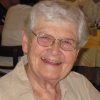Maryknoll sister brings special gifts to people with disabilities in China
Maryknoll Sister Ngoc-Hà Pham is no stranger to perilous situations. Born in Saigon in 1964 in the midst of the Vietnam War, she fled to the United States with her father and seven siblings when Saigon fell to the Communists in 1975. She lived in a refugee camp in Arkansas for six months and was not reunited with her mother and two brothers for 10 years. The family finally settled in San Diego, Calif.
“God,” says Sister Hà, “opened doors for me.” After becoming a nurse, she worked in a public hospital, where she saw a copy of MARYKNOLL magazine with a story of Maryknoll missioners’ work in her homeland. The story stuck.
“I returned to Vietnam for a visit 20 years after my family had left,” she says. “One day, as I was looking out from a comfortable, air-conditioned hotel room and seeing the harsh poverty of so many people, I asked myself, ‘Where do I feel more at home? How best can I serve and love God?’ That’s when I decided to become a missionary.”

Sister Hà dishes up a tasty meal for a student. (Courtesy of H. Pham/China)
For seven years as a Maryknoll sister in El Salvador she ministered to people with AIDS and youth at risk to gang violence. Then God opened another door: to China.
After studying Mandarin for two years at Sun Yat-San University in Guangzhou, she heard of a program run by a non-governmental organization called Huiling (Brilliant Spirits) Center. “They needed a translator who could speak Mandarin, Spanish and English,” Sister Hà says. “It seemed like the perfect fit for me!”
She signed a contract for one year, but her work was terminated after only a month. “I thought, ‘I must be doing a poor job,’ ” she says, “but I was told, ‘We need you more as a nurse’!”
Sister Hà soon discovered the need for more than her nursing skills. Huiling, she explains, is a center whose mission is to improve the quality of life of people with mental and physical disabilities and their families. Most of the residents, who are referred to as “students,” are severely challenged with autism. Some also have cerebral palsy, and suffer from bipolar disorder and schizophrenia. Many of the people with disabilities are unable to speak and can only communicate through sign language. “They need a quiet, peaceful presence,” she says.
She mentions one schizophrenic student with cerebral palsy who got agitated and tried to harm himself. “I gently said, ‘Why don’t you sit with me?’ Sitting in quiet meditation with peaceful music calmed him,” she says. “One day he was so calm he seemed to have an aura around him.”

At Huiling Center in Guangzhou, China, Maryknoll Sister Ngoc-Hà Pham helps people with mental and physical disabilities find peace and joy. (Courtesy of H. Pham/China)
She describes another student, a young woman who has fits of screaming and scratching herself until she bleeds. “I just sit with her, hold her hand and gently stroke it, telling her how beautiful she is until she calms down,” says Sister Hà. “I find that with any student who is acting up, I sit with them and I silently pray with them, sometimes out loud and it quiets them down.”
Sister Hà says she is a mystery to her co-workers in China, where proselytizing is forbidden by law. “When I first went there, a friend introduced me to the staff as ‘sister,’ so this word stuck with them,” she says. “Some call me ‘Xiunu,’ which means ‘sister,’ but they don’t know what a religious sister is. They do know that I am alone and have no family nearby, and, to the Chinese, family is the most important thing, so they have taken me into their family.”
She says often her co-workers come to her apartment and ask her why she would voluntarily devote her life to such hard work far away from her home. “They can’t understand why I would leave my family to be here and do the work I do, why I am not married and if I ever feel lonely,” she says. “I explain that I’m attracted to the Chinese people. There is a long history of animosity between the Vietnamese and Chinese, and there is a part of me that wants to be here to make peace, and because of a special love that in my faith I call God.”

Sister Ngoc-Hà Pham offers her hand and heart to people with physical disabilities. (Courtesy of H. Pham/China)
She explains that although she can’t speak directly about God, she expresses God’s love by sharing the gifts she has with those in need. “I try to show that love through my relationships with them, rather than by words,” she says simply.
Reflecting on her life and especially her current mission in China, Sister Hà says, “I trust that I am not here on my own and that I am guided by the Holy Spirit. I really appreciate being here. It is so much more than what I had hoped for. I believe that from the very beginning God led me here and opened the door for me.”
Featured Image: Sister Hà (center) and students with disabilities enjoy painting a mural at Huiling Center. (Courtesy of H. Pham/China)

